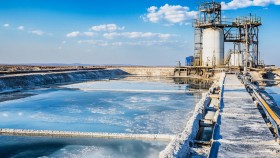How Australia’s election will decide its role in climate change
17 May 2019
For the fourth time in little more than a decade, an Australian election features a fierce battle over climate-change policy. Analysts say the result will decide whether the country stays on its current path, with national greenhouse gas emissions increasing, or adopts an ambitious target to reduce its pollution, which could pressure other nations to increase their commitments.
Australians are increasingly experiencing the effects of climate change, from extreme weather to mass coral bleaching on the Great Barrier Reef. But the country also remains one of the world’s biggest carbon emitters per capita and is responsible for exporting one-third of global coal. These issues have had an outsized effect on the nation's politics, playing a part in the downfall of the past five prime ministers.
Whether that becomes six will be decided on 18 May. Voter surveys suggest a tight race, but that the right-wing Liberal–National coalition government, led by Prime Minister Scott Morrison, is likely to be ousted by the main opposition, the centre-left Australian Labor Party.
Read the full Nature article by Adam Morton including commentary by Prof Frank Jotzo.
Updated: 26 July 2019/Responsible Officer: College of Science/Page Contact: https://iceds.anu.edu.au/contact
















